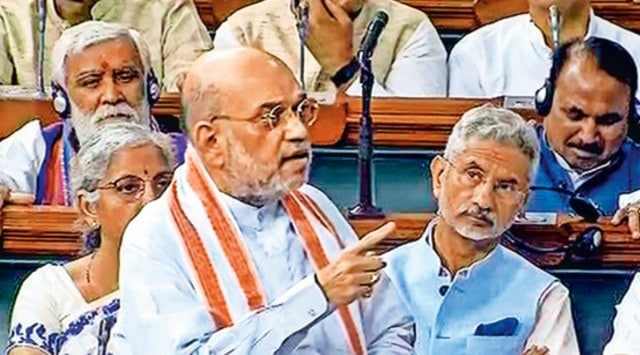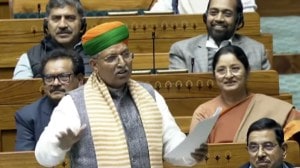Union Home Minister Amit Shah Friday, introducing the revamped IPC as Bharatiya Nyaya Sanhita, 2023 said that the government had taken a “historic” decision to repeal the sedition law (IPC Section 124A).
However, the new code, under Section 150, includes a provision within the category of “offences against the state.” This distinctly addresses the imposition of punishment — from seven years to life — for acts that endanger the sovereignty, unity, and integrity of India. And widens the ambit to include financial transactions and electronic communication.

“Rajdroh par Angrezon ne apne shashan ko bachane ke liye ek kanoon banaya tha. Mai is sadan ko kahana chahta hun ki ek aitihasik nirnay is sarkaar ne kiya hai. Rajdroh ko completely ham repeal kar rahe hain… Yahan loktantra hai, sabko bolne ka adhikar hai. (Britishers enacted a law of sedition to protect their regime. I want to inform this House that this government has taken a historic decision. We are repealing the sedition law completely… There is democracy in the country, everybody has a right to speak.)” Shah said.
Section 150 of the new Bill refrains from using the word, “sedition”, but its definition parallels the established provisions of sedition outlined in Section 124-A of the Indian Penal Code (IPC).
Section 150 states: “Whoever, purposely or knowingly, by words, either spoken or written, or by signs, or by visible representation, or by electronic communication or by use of financial mean, or otherwise, excites or attempts to excite, secession or armed rebellion or subversive activities, or encourages feelings of separatist activities or endangers sovereignty or unity and integrity of India; or indulges in or commits any such act shall be punished with imprisonment for life or with imprisonment which may extend to seven years and shall also be liable to fine.”
Clearly, this is distinctly different from Section 124-A.
One notable distinction is the incorporation of the phrases “purposely or knowingly,” which overtly introduces the element of mens rea, signifying the presence of criminal intent.
Moreover, this new section expands the definition of the offence, by encompassing the terms “electronic communication” and “use of financial mean”. In contrast to Section 124-A, which implicitly addressed electronic communications through the words “either spoken or written,” the new Bill explicitly outlines “electronic communication.” This could potentially include WhatsApp, emails, social media posts and private forwards.
Story continues below this ad
Significantly, Section 150 explicitly introduces the concept of “use of financial mean,” thereby enabling the law to charge the accused persons with alleged violations linked to financial transactions under this section.
Next, in contrast to Section 124-A of the IPC, the Section 150 specifies four distinct offenses that could lead to charges against an accused individual. These offenses include engaging in secession, participating in armed rebellion, undertaking subversive activities, or encouraging feelings of separatist activities. However, while doing so, Section 150 does not define ‘subversive activities’.
Legal scholar and Vice-Chancellor of Chanakya National Law University, Patna, Faizan Mustafa says that the expression “subversive activities” is “too wide”. “…Because it is the thumb rule of criminal law that crimes are to be defined in the narrowest possible words,” Mustafa said.
Mustafa adds a caveat: “It looks good that the offence of sedition is not there in the same form in which it was there in the IPC. It is also good that the requirement of mens rea or guilty mind has been clearly included in the offence; and ‘armed rebellion, secession’ words have been used to narrow down the ambit of the offence.”
Story continues below this ad
Mustafa also highlights that Section 150 has completely dropped the term “excites or attempts to excite disaffection” towards the government used under section 124-A IPC. “… It is also good that disaffection word has been dropped because no government in a modern democracy can claim the right to affection,” Mustafa said.
Mustafa flagged that the explanation given in the bill is incomplete. “It does not say that comments without exciting or attempting to excite will not constitute an offence under this section,” he said.
Criminal lawyer and Senior Advocate Rebecca John also flagged this. “I think that the explanation is incomplete. It is not coherent. I cannot understand the English language used in the provision. Remember these provisions are made for various stakeholders: judges to interpret, lawyers to argue, litigants to understand what is legal or illegal, police officers to enforce. If your language is complicated, and that seems to have been the critique as far as the old laws were concerned — that they were very colonial— we have further complicated it,” John said.
⚖️Want to understand the Centre’s recent overhaul of criminal laws better? We’ve got you covered. Check out some of our special reportage:
👉🏼 From holding trials on video to community service as punishment: Centre’s overhaul of criminal laws
👉🏼 Key provisions and processes proposed in Bill to replace CrPC
👉🏼 Expert Explains: What does the proposed legislation to overhaul criminal justice system mean?
👉🏼 From holding trials on video to community service as punishment: Centre’s overhaul of criminal laws









